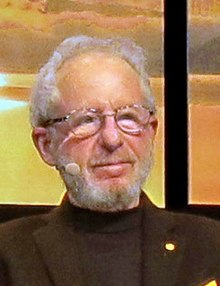Alan J. Heeger
| Alan J. Heeger | |
|---|---|
 |
|
| Born | Alan Jay Heeger January 22, 1936 Sioux City, Iowa, United States |
| Nationality | American |
| Fields | Physics, Chemistry |
| Institutions |
University of Pennsylvania University of California, Santa Barbara |
| Alma mater |
University of Nebraska University of California, Berkeley |
| Doctoral advisor | Alan Portis |
| Notable awards |
Nobel Prize in Chemistry (2000) Balzan Prize ENI award Oliver E. Buckley Condensed Matter Prize (1983) |
| Spouse | Ruth (2 children) |
Alan Jay Heeger (born January 22, 1936) is an American physicist, academic and Nobel Prize laureate in chemistry.
Heeger was born in Sioux City, Iowa, to a Jewish family. He grew up in Akron, Iowa, where his father owned a general store. At age nine, following his father's death, the family moved to Sioux City.
Heeger earned a B.S. in physics and mathematics from the University of Nebraska-Lincoln in 1957, and a Ph.D in physics from the University of California, Berkeley in 1961. From 1962 to 1982 he was on the faculty of the University of Pennsylvania. In 1982 he commenced his present appointment as a professor in the Physics Department and the Materials Department at the University of California, Santa Barbara. His research has led to the formation of numerous start-up companies including Uniax, Konarka, and Sirigen, founded in 2003 by Guillermo C. Bazan, Patrick J. Dietzen, Brent S. Gaylord. Alan Heeger was a founder of Uniax, which was acquired by DuPont.
He won the Nobel Prize for Chemistry in 2000 along with Alan G. MacDiarmid and Hideki Shirakawa "for their discovery and development of conductive polymers;" They published their results on polyacetylene a conductive polymer in 1977
...
Wikipedia
